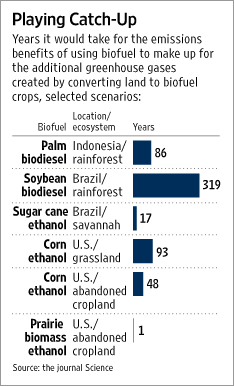
Source of graph: online version of the WSJ article quoted and cited below.
(p. A4) While the U.S. and others race to expand the use and production of biofuels, two new studies suggest these gasoline alternatives actually will increase carbon-dioxide levels.
A study published in the latest issue of Science finds that corn-based ethanol, a type of biofuel pushed heavily in the U.S., will nearly double the output of greenhouse-gas emissions instead of reducing them by about one-fifth by some estimates. A separate paper in Science concludes that clearing native habitats to grow crops for biofuel generally will lead to more carbon emissions.
The findings are the latest to take aim at biofuels, which have already been blamed for pushing up prices of corn and other food crops, as well as straining water supplies. The Energy Department expects U.S. ethanol production to reach about 7.5 billion gallons this year from 3.9 billion in 2005, encouraged by high prices and government support. The European Union has proposed that 10% of all fuel used in transportation should come from biofuels by 2020.
Some scientists have praised biofuels because growing biofuel feedstock would remove gases that trap the sun’s heat from the air, while gasoline and diesel fuel take carbon from the ground and put it in the air. However, some earlier studies didn’t account for one hard-to-measure factor: the decision by farmers world-wide to convert forest and grasslands to grow feedstock for the new biofuels.
. . .
[One] study’s funding came from the National Science Foundation and the University of Minnesota’s Initiative on Renewable Energy and the Environment, . . . The other paper relied on funding from various indirect sources, including the Hewlett Foundation and the Agriculture Department.
For the full story, see:
GAUTAM NAIK. “Biofuels Hold Potential for Greater Levels of CO2; Land Use for Crops May Cancel Out Benefits of Use.” The Wall Street Journal (Fri., February 8, 2008): A4.
(Note: ellipses added; and bracketed word added.)
(Note: the somewhat different title of the online version was “Biofuels May Hinder Antiglobal-Warming Efforts; Carbon Emissions Could Increase As Land-Use Shifts.”)

